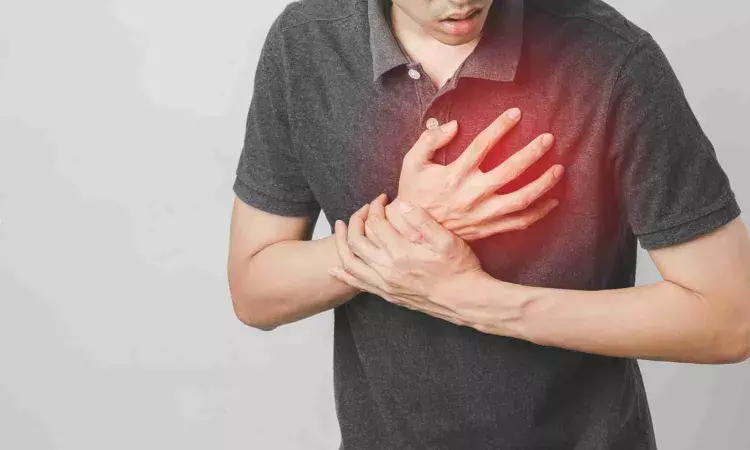- Home
- Medical news & Guidelines
- Anesthesiology
- Cardiology and CTVS
- Critical Care
- Dentistry
- Dermatology
- Diabetes and Endocrinology
- ENT
- Gastroenterology
- Medicine
- Nephrology
- Neurology
- Obstretics-Gynaecology
- Oncology
- Ophthalmology
- Orthopaedics
- Pediatrics-Neonatology
- Psychiatry
- Pulmonology
- Radiology
- Surgery
- Urology
- Laboratory Medicine
- Diet
- Nursing
- Paramedical
- Physiotherapy
- Health news
- Fact Check
- Bone Health Fact Check
- Brain Health Fact Check
- Cancer Related Fact Check
- Child Care Fact Check
- Dental and oral health fact check
- Diabetes and metabolic health fact check
- Diet and Nutrition Fact Check
- Eye and ENT Care Fact Check
- Fitness fact check
- Gut health fact check
- Heart health fact check
- Kidney health fact check
- Medical education fact check
- Men's health fact check
- Respiratory fact check
- Skin and hair care fact check
- Vaccine and Immunization fact check
- Women's health fact check
- AYUSH
- State News
- Andaman and Nicobar Islands
- Andhra Pradesh
- Arunachal Pradesh
- Assam
- Bihar
- Chandigarh
- Chattisgarh
- Dadra and Nagar Haveli
- Daman and Diu
- Delhi
- Goa
- Gujarat
- Haryana
- Himachal Pradesh
- Jammu & Kashmir
- Jharkhand
- Karnataka
- Kerala
- Ladakh
- Lakshadweep
- Madhya Pradesh
- Maharashtra
- Manipur
- Meghalaya
- Mizoram
- Nagaland
- Odisha
- Puducherry
- Punjab
- Rajasthan
- Sikkim
- Tamil Nadu
- Telangana
- Tripura
- Uttar Pradesh
- Uttrakhand
- West Bengal
- Medical Education
- Industry
Precision robotics offers hope for heart disease treatment, claims research

An advanced robotic system at The Hospital for Sick Children (SickKids) is changing the way physicians and scientists approach treatments for heart disease.
Arrhythmogenic cardiomyopathy (ACM) is a leading cause of sudden cardiac death among young adults. Without any treatment, a heart transplant remains the only curative option for those living with the inherited condition.
Now, a research team led by Dr. Jason Maynes at SickKids and Drs. Yu Sun and Xinyu Liu from the University of Toronto (U of T) Robotics Institute have developed a robotic technology that allows scientists to test numerous potential therapeutics, simultaneously, in this condition for the first time.
“This technology will allow us to get the right drug, to the right person, at the right time,” says Maynes, Chief of the Department of Anesthesia and Pain Medicine, Associate Chief of Research for Perioperative Services and Senior Scientist in the Molecular Medicine program.
Microinjection into beating heart tissue
Technological advancements have contributed to a rise in high-throughput screening (the ability to test a large number of potential therapeutics at once) across a range of health conditions, including oncology. However, unlike cancer cells, scientists studying heart conditions face a unique challenge: three-dimensional (3D) dynamic movement of the heart cells. The movement makes it hard for traditional drug screening technologies to quickly and accurately inject molecules into the beating cardiomyocyte tissue without causing damage to them.
Faced with this challenge, the research team developed a solution – a tiny robot equipped with a special z-shaped micropipette and a 3D imaging system that can insert a fluorescent molecule into drug-treated beating heart cells with speed and precision, allowing scientists to analyze the efficacy of the drug candidates.
Published in Science Robotics, the findings showcase the innovative technology and highlight its potential to revolutionize advanced therapeutics for heart conditions.
"Using this system, our team was able to identify five potential therapies for ACM," says first-author Dr. Wenkun Dou, a postdoctoral fellow at SickKids and U of T. “This type of discovery can only happen when experts from different fields come together.”
With collaborators at the Centro Nacional de Investigaciones Cardiovasculares (CNIC) in Spain, one of the drug candidates was already shown to reduce irregular heartbeats in an ACM preclinical model.
The future of heart treatment
For patients and families affected by ACM, this research holds potential to accelerate the discovery of new treatments and could effectively eliminate the need for invasive heart surgery. But thanks to the personalized approach to high-throughput screening, the research team believes the impacts could echo far beyond ACM as part of SickKids’ vision of Precision Child Health, a movement to deliver individualized care to every patient.
“The ability to model specific patient conditions and test therapies quickly and with high volume means that treatments can be tailored to the individual needs of each patient,” says Maynes.
Reference:
Wenkun Dou, Guanqiao Shan, Qili Zhao, Manpreet Malhi , Aojun Jiang, Robotic manipulation of cardiomyocytes to identify gap junction modifiers for arrhythmogenic cardiomyopathy, Science Robotics, DOI: 10.1126/scirobotics.adm8233.
Dr Kamal Kant Kohli-MBBS, DTCD- a chest specialist with more than 30 years of practice and a flair for writing clinical articles, Dr Kamal Kant Kohli joined Medical Dialogues as a Chief Editor of Medical News. Besides writing articles, as an editor, he proofreads and verifies all the medical content published on Medical Dialogues including those coming from journals, studies,medical conferences,guidelines etc. Email: drkohli@medicaldialogues.in. Contact no. 011-43720751


